Spartacus Book List
20th Century History

Title: The Unfinished Journey
Author: William H. Chafe
Publisher: Oxford University Press
Price: £40.00
Bookshop: Amazon
Spartacus Website: The USA
Category: 20th Century History
Responds to the "Grand Challenges in Environmental Sciences" identified several years ago by the U.S. National Research Council, with attention to topics such as biodiversity and ecosystem functioning, hyrologic forecasting, and land-use dynamics. This popular and classic text chronicles America's roller-coaster journey through the decades since World War II. Considering both the paradoxes and the possibilities of postwar America, William H. Chafe portrays the significant cultural and political themes that have colored our country's past and present, including issues of race, class, gender, foreign policy, and economic and social reform. He examines such subjects as the Vietnam War, the civil rights movement, the origins and the end of the Cold War, the culture of the 1970s, the rise of the New Right, the events of September 11th and their aftermath, and various presidencies. Now thoroughly revised and updated, the seventh edition of The Unfinished Journey combines and reorganizes several chapters.

Title: Collision Course
Author: Joseph A. McCartin
Publisher: Oxford University Press
Price: £18.99
Bookshop: Amazon
Spartacus Website: Ronald Reagan
Category: 20th Century History
In August 1981, the Professional Air Traffic Controllers Organization (PATCO) called an illegal strike. The new president, Ronald Reagan, fired the strikers, establishing a reputation for both prompt resolution and hostility to organized labor. As Joseph A. McCartin writes, the strike was the culmination of two decades of bitter hostility between labor management that stemmed from the high-pressure nature of the job and the controllers>' lack of control in the workplace. The fall of PATCO not only ushered in a long period of labor decline; it also served as a harbinger for the current campaign against public sector unions that now roils American politics. Collision Course sets the strike within a vivid panorama of the rise and near fall of the world>'s busiest air-traffic control system. It begins with an arresting account of the mid-air collision in 1960 over Park Slope, Brooklyn that cost 134 lives and exposed the weaknesses of an overburdened system. Through the stories of controllers like Mike Rock and Jack Maher, who were galvanized into action by the disaster and went on to found PATCO, McCartin describes the camaraderie and professionalism of those who sought to both make the airways safer and enter the ranks of a burgeoning middle class. It climaxes with the story of Reagan and the controllers, who surprisingly endorsed the Republican on the promise that he would address controllers>' grievances. That brief, fateful alliance triggered devastating miscalculations that changed the course of history, establishing patterns that still govern America>'s labor politics. Written with an eye for detail and a grasp of the vast consequences of PATCO conflict for both air travel and America>'s working class, Collision Course is a stunning achievement.
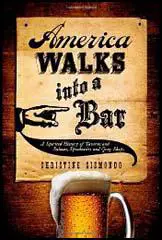
Title: America Walks into a Bar
Author: Christine Sismondo
Publisher: Oxford University Press
Price: £15.99
Bookshop: Amazon
Spartacus Website: Prohibition
Category: 20th Century History
When George Washington bade farewell to his officers, he did so in New York's Fraunces Tavern. When Andrew Jackson planned his defense of New Orleans against the British in 1815, he met Jean Lafitte in a grog shop. And when John Wilkes Booth plotted with his accomplices to carry out a certain assassination, they gathered in Surratt Tavern. In America Walks into a Bar, Christine Sismondo recounts the rich and fascinating history of an institution often reviled, yet always central to American life. She traces the tavern from England to New England, showing how even the Puritans valued "a good Beere." With fast-paced narration and lively characters, she carries the story through the twentieth century and beyond, from repeated struggles over licensing and Sunday liquor sales, from the Whiskey Rebellion to the temperance movement, from attempts to ban "treating" to Prohibition and repeal. As the cockpit of organized crime, politics, and everyday social life, the bar has remained vital--and controversial--down to the present. In 2006, when the Hurricane Katrina Emergency Tax Relief Act was passed, a rider excluded bars from applying for aid or tax breaks on the grounds that they contributed nothing to the community. Sismondo proves otherwise: the bar has contributed everything to the American story. In this heady cocktail of agile prose and telling anecdotes, Sismondo offers a resounding toast to taprooms, taverns, saloons, speakeasies, and the local hangout where everybody knows your name.
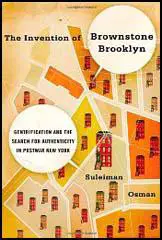
Title: The Invention of Brownstone Brooklyn
Author: Suleiman Osman
Publisher: Oxford University Press
Price: £18.99
Bookshop: Amazon
Spartacus Website: New York City
Category: 20th Century History
The gentrification of Brooklyn has been one of the most striking developments in recent urban history. Considered one of the city's most notorious industrial slums in the 1940s and 1950s, Brownstone Brooklyn by the 1980s had become a post-industrial landscape of hip bars, yoga studios, and beautifully renovated, wildly expensive townhouses. In The Invention of Brownstone Brooklyn, Suleiman Osman offers a groundbreaking history of this unexpected transformation. Challenging the conventional wisdom that New York City's renaissance started in the 1990s, Osman locates the origins of gentrification in Brooklyn in the cultural upheavals of the 1960s and 1970s. Gentrification began as a grassroots movement led by young and idealistic white college graduates searching for "authenticity" and life outside the burgeoning suburbs. Where postwar city leaders championed slum clearance and modern architecture, "brownstoners" (as they called themselves) fought for a new romantic urban ideal that celebrated historic buildings, industrial lofts and traditional ethnic neighborhoods as a refuge from an increasingly technocratic society. Osman examines the emergence of a "slow-growth" progressive coalition as brownstoners joined with poorer residents to battle city planners and local machine politicians. But as brownstoners migrated into poorer areas, race and class tensions emerged, and by the 1980s, as newspapers parodied yuppies and anti-gentrification activists marched through increasingly expensive neighborhoods, brownstoners debated whether their search for authenticity had been a success or failure. The Invention of Brownstone Brooklyn deftly mixes architectural, cultural and political history in this eye-opening perspective on the post-industrial city.
.
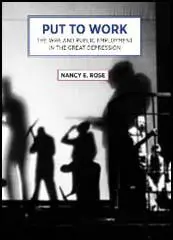
Title: Put to Work: The WPA and Public Emplyment in the Great Depression
Author: Nancy E. Rose
Publisher: Monthly Review Press
Price: £10.95
Bookshop: Amazon
Spartacus Website: The New Deal
Category: 20th Century History
Put To Work tells the story of the massive government job-creation programs of the 1930s—not only the Works Progress Administration (WPA), but also the lesser known Federal Emergency Relief Administration (FERA) and Civil Works Administration (CWA), which set the framework for the ideological and policy battles that followed. Nancy E. Rose details the development of these programs, the pressures that surrounded them, and the resulting constraints. She analyzes both their unique contributions and their shortcomings, especially in their treatment of women and African-Americans. This second edition includes a new introduction and afterword by the author in which she examines the Obama administration’s economic stimulus program in historical perspective.
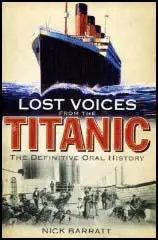
Title: Lost Voices from the Titanic
Author: Nick Barratt
Publisher: Preface Publishing
Price: £20.00
Bookshop: Amazon
Spartacus Website: British History
Category: 20th Century History
Starting from its original conception and design by the owners and naval architects at the White Star Line through construction at Harland and Wolff's shipyards in Belfast, Nick Barratt explores the pre-history of the Titanic. He examines the aspirations of the owners, the realities of construction and the anticipation of the first sea-tests, revealing that the seeds of disaster were sown by the failure to implement sealed bulkheads - for which the original plans are now available. Barratt then looks at what it was like to embark on the Titanic's maiden voyage in April 1912. The lives of various passengers are examined in more detail, from the first class aristocrats enjoying all the trappings of privilege, to the families in third-class and steerage who simply sought to leave Britain for a better life in America. Similarly, the stories of representatives from the White Star Line who were present, as well as members of the crew, are told in their own words to give a very different perspective of the voyage. Finally, the book examines the disaster itself, when Titanic struck the iceberg on 14 April and sunk hours later. Survivors from passengers and crew explain what happened, taking you back in time to the full horror of that freezing Atlantic night when up to 1,520 people perished. The tragedy is also examined from the official boards of inquiry, and its aftermath placed in a historic context - the damage to British prestige and pride, and the changes to maritime law to ensure such an event never took place again. The book concludes by looking at the impact on those who escaped, and what became of them in the ensuing years; and includes the words of the last living survivor, Millvina Dean.
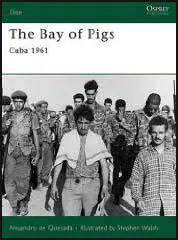
Title: The Bay of Pigs: Cuba 1961
Author: Alejandro de Quesada
Publisher: Osprey
Price: £11.99
Bookshop: Amazon
Spartacus Website: Bay of Pigs
Category: 20th Century History
In early 1961 President John F. Kennedy gave the go-ahead to an existing plan for Cuban exiles to return to overthrow Fidel Castro's communist regime. While the CIA helped in the planning stages, the attempt would not be assisted by any US armed forces. On the night of April 16, 1961, a force of 1,400 exiles, known as 2506 Brigade, landed at the Bay of Pigs on the south coast of Cuba, supported by a few World War II vintage aircraft flying from Nicaragua. While they succeeded in knocking out some of Castro's small air force on the ground, the remaining Cuban aircraft sank two of the exiles' support ships, and the beachhead became isolated. Fighting continued for three days before Castro's army overwhelmed the landing force. Most of the exiles were captured and suffered a harsh imprisonment before the US negotiated their release. This episode, followed by the installation of Soviet missiles in Cuba, led directly to the Cuban Missile Crisis of October 1962, and continues to affect US/Cuban diplomatic relations to this day. This book, written by the nephew of a surviving 2506 Brigade veteran, includes detailed color plates, unpublished photographs, and interviews with veterans.

Title: Launch Pad UK: Britain and the Cuban Missile Crisis
Author: Jim Wilson
Publisher: Pen & Sword
Price: £19.99
Bookshop: Amazon
Spartacus Website: Cuban Missile Crisis
Category: 20th Century History
For most British people the weekend of 27/28 October 1962 could so very easily have been their last weekend on earth, yet astonishingly the fact that Britain's nuclear deterrent forces went to an unprecedented level of readiness was kept secret from the public. Thor nuclear-tipped ballistic missiles stood on a round-the-clock wartime state of alert ready to be fired, these were the 'other' missiles of the Cuban Missile Crisis, which made Britain, in effect, America's launch pad. During the height of the crisis both RAF Bomber Command and the US Strategic Air Command were poised at the highest states of readiness. Both were ordered to a level of war readiness unparalleled throughout the whole of the forty years of Cold War. There is evidence to suggest that had the US needed to launch an air strike against Russian missiles in Cuba, President Kennedy might have been willing to absorb a Soviet nuclear assault on a NATO ally without retaliation, if it would have avoided escalation to World War Three. It is sobering to those who lived through that period that, the British Ambassador to Cuba commented: 'If it was a nuclear war we were headed for, Cuba was perhaps a better place to be than Britain!'
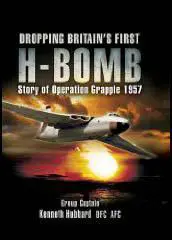
Title: Developing Britain's First H-Bomb
Author: Kenneth Hubbard & Michael Simmons
Publisher: Pen & Sword
Price: £19.99
Bookshop: Amazon
Spartacus Website: Harold Macmillan
Category: 20th Century History
On 15th May 1957 Vickers Valiant V-Bomber XD818 under the command of Wg Cdr Kenneth Hubbard dropped Britain's first live thermonuclear bomb. Grapple was a top secret experiment that involved units from all the UK's defence services and a multitude of leading scientists and technicians. It was based on the Christmas and Malden Islands in the Pacific Ocean, and therefore the initial transportation and logistics planning was of priority importance.
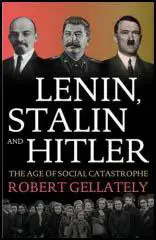
Title: Lenin, Stalin and Hitler
Author: Robert Gellately
Publisher: Vintage
Price: £10.99
Bookshop: Amazon
Spartacus Website: Joesph Stalin
Category: 20th Century History
This remarkably ambitious book tells the story of the great social and political catastrophe that enveloped Europe between 1914 and 1945. In a period of almost continuous upheaval society was transformed by two world wars, the Russian Revolution, the Holocaust and the rise and fall of the Third Reich. Combining a powerful narrative with profound analysis, acclaimed historian Robert Gellately argues that these tragedies are inextricably linked and that to consider them as discrete events is to misunderstand their genesis and character. Central, of course, to the catastrophe were the dictators Lenin, Stalin, and Hitler and this book makes unprecedented use of recently opened Russian and German sources to explain how their pursuit of utopian - and dreadfully flawed - ideals led only to dystopian nightmare.
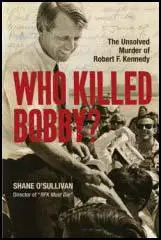
Title: Who Killed Bobby?
Author: Shane O'Sullivan
Publisher: Union Square Press
Price: £14.99
Bookshop: Amazon
Spartacus Website: Robert Kennedy
Category: 20th Century History
On June 5th, 1968, at L.A.'s Ambassador Hotel, Robert F. Kennedy celebrated his victory in the California Democratic primary with a rousing victory speech anticipating a successful run for the presidency. Moments later, gunshots shattered that dream: like his brother before him, Bobby Kennedy lay mortally wounded at the hand of an assassin. The police quickly apprehended Sirhan Sirhan, who the world believed had single-handedly masterminded the shooting. Shockingly, that may not be so, as documentary filmmaker Shane O'Sullivan presents powerful new evidence to the contrary.
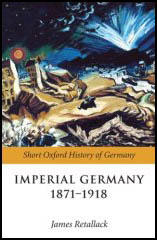
Title: Imperial Germany 1871-1918
Author: James Retallack
Publisher: Oxford University Press
Price: £50.00
Bookshop: Amazon
Spartacus Website: Germany 1900-45
Category: German History
The German Empire was founded in January 1871 not only on the basis of Chancellor Otto von Bismarck's 'blood and iron' policy but also with the support of liberal nationalists. Under Bismarck and Kaiser Wilhelm II, Germany became the dynamo of Europe. Its economic and military power were pre-eminent; its science and technology, education, and municipal administration were the envy of the world; and its avant-garde artists reflected the ferment in European culture. But Germany also played a decisive role in tipping Europe's fragile balance of power over the brink and into the cataclysm of the First World War, eventually leading to the empire's collapse in military defeat and revolution in November 1918. With contributions from an international team of twelve experts in the field, this volume offers an ideal introduction to this crucial era, taking care to situate Imperial Germany in the larger sweep of modern German history, without suggesting that Nazism or the Holocaust were inevitable endpoints to the developments charted here.
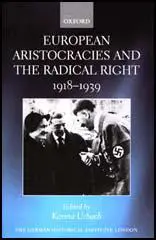
Title: European Aristocracies and the Radical Right, 1918-1939
Author: Karina Urbach
Publisher: Oxford University Press
Price: £60.00
Bookshop: Amazon
Spartacus Website: The Right Club
Category: 20th Century History
This volume brings together the most recent research on European aristocracies in the first half of the twentieth century. An international array of social and political historians analyses the aristocracies of eleven countries at a particularly testing time: the interwar years. After the First World War aristocrats were confronted with revolutions, republics, and an influx of 'Bolshevist' ideas. Debates about a new order in which aristocrats would play a leading part took place in all countries after 1918. The Mussolini model, in particular, seemed an ideal solution and had an impact on aristocrats all over Europe. Here the exchange of ideas between networks of related aristocratic families played a part in spreading pro-fascist ideas. Anti-Semitism, anti-Bolshevism, and a belief in charismatic leadership also led to admiration of leaders such as Horthy and Franco. In all countries radical right-wing movements tried to recruit aristocrats as symbolic if not strategic figureheads. Is it possible, therefore, to speak of a last flourishing of the aristocracy in countries where fascist or authoritarian regimes were successful? Or are we falling for a left-wing conspiracy theory by overestimating the aristocracy's political prowess and failing to see that they often stood as a conservative bulwark against the radical right? The book shows that if radical right-wing parties could not offer new avenues to power centres, aristocrats, despite a natural predisposition, were not tempted to join, or soon lost interest. Yet their flirtations and short-term entanglements with these movements show that they played a destructive role in the great crisis years of parliamentarism.

Title: Weimar Germany: Promise and Tragedy
Author: Eric D. Weitz
Publisher: Princeton University Press
Price: £17.95
Bookshop: Amazon
Spartacus Website: Weimar Republic
Category: Travel Writing
Weimar Germany still fascinates us, and now this complex and remarkably creative period and place has the history it deserves. Eric Weitz's new book reveals the Weimar era as a time of strikingly progressive achievements - and even greater promise. With a rich thematic narrative and detailed portraits of some of Weimar's greatest figures, this comprehensive history recaptures the excitement and drama as it unfolded, viewing Weimar in its own right - and not as a mere prelude to the Nazi era. "Weimar Germany" tells how Germans rose from the defeat of World War I and the turbulence of revolution to forge democratic institutions and make Berlin a world capital of avant-garde art. Setting the stage for this story, Weitz takes the reader on a walking tour of Berlin to see and feel what life was like there in the 1920s, when modernity and the modern city - with its bright lights, cinemas, "new women," cabarets, and sleek department stores - were new. We learn how Germans enjoyed better working conditions and new social benefits and listened to the utopian prophets of everything from radical socialism to communal housing to nudism. "Weimar Germany" also explores the period's revolutionary cultural creativity, from the new architecture of Erich Mendelsohn, Bruno Taut, and Walter Gropius to Hannah Hoch's photomontages and Bertolt Brecht and Kurt Weill's theater. Other chapters assess the period's turbulent politics and economy, and the recipes for fulfilling sex lives propounded by new "sexologists." Yet "Weimar Germany" also shows how entrenched elites continually challenged Weimar's achievements and ultimately joined with a new radical Right led by the Nazis to form a coalition that destroyed the republic. Thoroughly up-to-date, skillfully written, and strikingly illustrated, "Weimar Germany" brings to life as never before an era of creativity unmatched in the twentieth century-one whose influence and inspiration we still feel today.
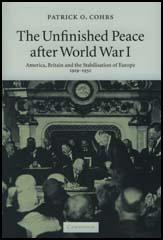
Title: The Unfinished Peace
Author: Patrick O. Cohrs
Publisher: Cambridge University Press
Price: £59.00
Bookshop: Amazon
Spartacus Website: Versailles Treaty
Category: 20th Century History
This is a highly original and revisionist analysis of British and American efforts to forge a stable Euro-Atlantic peace order between 1919 and the rise of Hitler. Patrick Cohrs argues that this order was not founded at Versailles but rather through the first 'real' peace settlements after World War I - the London reparations settlement of 1924 and the Locarno security pact of 1925. Crucially, both fostered Germany's integration into a fledgling transatlantic peace system, thus laying the only realistic foundations for European stability. What proved decisive was that key decision-makers drew lessons from the 'Great War' and Versailles' shortcomings. Yet Cohrs also re-appraises why they could not sustain the new order, master its gravest crisis - the Great Depression - and prevent Nazism's onslaught. Despite this ultimate failure, he concludes that the 'unfinished peace' of the 1920s prefigured the terms on which a more durable peace could be founded after 1945.
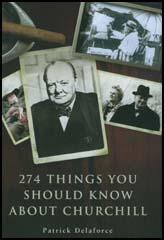
Title: 274 Things You Should Know About Winston Churchill
Author: Patrick Delaforce
Publisher: Michael O'Mara
Price: £9.99
Bookshop: Amazon
Spartacus Website: Winston Churchill
Category: 20th Century History
Prime Minister, statesman and wartime leader, master strategist, soldier, historian, orator, journalist, wit, writer and inventor - in short, a true colossus of a man - Sir Winston Leonard Spencer Churchill (1874-1965) was undoubtedly the greatest leader of the Second World War, and unarguably the greatest Briton of his age. Born at the height of British imperial power, and twice elected Prime Minister, he galvanized the British people and their allies to resist the onslaught from Nazi Germany and, later, Japan, and in doing became the architect of the destruction of these unquestionably evil empires. "274 Things You Should Know About Churchill" is a celebration of the man, his life and his monumental achievements, written by Patrick Delaforce, an experienced soldier and military author in his own right. It is perhaps too easy to forget that Churchill was more than an inspirational commander and figurehead to a nation. Indeed, it would be a gross dishonour to his memory to think only this of him, for because - or in spite - of his numerous and varied successes, Churchill was also a full-bloodied human being, with all of the foibles, attitude, distemper, pig-headedness and conceit that are so often the shadows of such greatness. Similarly forgotten, beyond the demands of Parliament he lived a full and varied life in an ebullient and mischievous way; sailing the seas with his wife, Clemmie, on the Admiralty yacht, HMS Enchantress, owning racehorses, playing polo, entertaining friends, all of which, and more, find a place within "274 Things You Should Know About Churchill", retold and recounted. Beautifully packaged, "274 Things You Should Know About Churchill" is, like the best miscellanies, a many-sided work; a great source of anecdotes and memories, an insight into his larger-than-life personality, a record of his often caustic yet brilliant wit, and, by the use of long out-of-print and forgotten sources, a document of his remarkable and inestimable contribution to the modern world. To contain such a man within the pages of a book is a formidable task - a man owed so much by so many, to paraphrase one of his most famous speeches - yet "274 Things You Should Know About Churchill" is, like its subject, a very notable triumph.
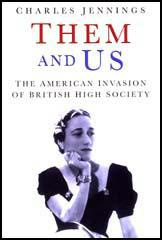
Title: Them and Us
Author: Charles Jennings
Publisher: Sutton
Price: £20.00
Bookshop: Amazon
Spartacus Website: Henry Channon
Category: 20th Century History
In 1936, Henry 'Chips' Channon gave a lavish dinner for King Edward VIII and Wallis Simpson at his house in Belgrave Square. Feasting on blinis, caviare, sole and beef, served by the ruthlessly-drilled precision of Chips' staff, it was a vivid demonstration of just how far the Americans had percolated high society. The British aristocracy, impoverished by death duties, agricultural collapse and higher taxation, as well as morally shattered by the First World War, could only look on. It was as if the world had been turned upside down. As Lady Londonderry observed, it seemed as if London was 'being run by an American syndicate'. What had happened to bring about this change? How had the Americans become so powerful, so rich, so over here? "Them and Us" is a story of social upheaval, of the transformation which took place when British high society - that bastion against the forces of the New - gave in to America. A lively mix of anecdote and social history, Charles Jennings' new book brings to life the most striking characters of the time and the extravagant, high-voltage period in which they lived, giving a real sense of their follies, dramas, tragedies and longings.

Title: In Defence of Atheism
Author: Michael Onfray
Publisher: Serpents Tail
Price: £18.99
Bookshop: Amazon
Spartacus Website: Religion and Society
Category: 20th Century History
In the twenty-first century, religion is making a comeback, bringing in its wake extremism of all kinds. From Christian anti-abortion campaigns to suicide bombers claiming the righteousness of Islam, we are witnessing a resurgence of fundamentalism. Michel Onfray’s response to the threat of a post-modern theocracy is to lay down the principles of an authentic atheism: exposing the fiction that is God, he proposes instead a new philosophy of reason that celebrates life and humanity. In Defence of Atheism demonstrates that organised religion is motivated by worldly, historical and political power; that the three dominant monotheisms – Christianity, Islam and Judaism – exhibit the same hatred of women, reason, the body, the passions; that religion denies life and glorifies death. Onfray exposes some uncomfortable truths: Judaism invented the extermination of a people; Jesus never existed historically; Christianity was enforced with extreme violence by Constantine; Islam is anti-Semitic, misogynist, warlike and incompatible with the values of a modern democracy.
